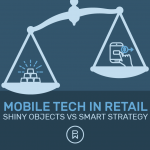As it approaches its third decade of existence, the internet is experiencing an identity crisis. More people are using it for more purposes than ever before, and it’s under far more scrutiny. Governments and other regulatory bodies are beginning to take a hard look at the laws and protocols that govern web and data use. The EU’s General Data Protection Regulation (GDPR), for example, will establish a new code of digital human rights covering everything from identity access to the right to data erasure when it goes into effect in May. At the same time, consumers are operating with splintered identities, forced to choose whether to protect their data from or share their data with the world.
At this year’s SXSW Interactive conference, the question of where our data travels and for what purpose took center stage. A two-day programming block called The Blockchain Rises was the centerpiece of the Interactive track, featuring dozens of blockchain-focused sessions and who-knows-how-many parties.
This focus on distributed ledger technology is evidence that as a society, we are reckoning with an unforeseen scale of globalization. We generate an unprecedented amount of data and feel collective fear and distrust of far-reaching global powers. The result is a climate where solutions like blockchain are born and applied in impressively creative ways. Here are some of the most interesting blockchain applications from SXSW Interactive 2018.
Blockchain, Your Data and You
We spent as much time as possible at SXSW 2018 hearing from experts and innovators in the blockchain space. From a discussion on rights management at “What Blockchain Means for Media & Entertainment” to an example of P2P solar energy distribution courtesy of Sandra Ro of Power Ledger, the use cases of distributed ledger technology explored at the Interactive sessions ran the gamut. Here are a few of the most compelling:
- Recordkeeping. In an era of mass displacement, human rights groups are turning toward blockchain for the future of identity records. Years of civil war in Syria have displaced millions of refugees. Exacerbating this crisis, the Syrian government has lost control of many of its fundamental government entities and organizations, including those that maintain records of citizenship. A 2015 UNHCR survey of 2,500 refugee families found that 68% were unable to register with the UN, a process that requires presentation and verification of a birth certificate. With almost 70,000 children born to registered Syrian refugees alone since 2011, this breakdown in records could have long-term implications. Not only would blockchain ledger of records would be indestructible, it would be immediately accessible to any pertinent party in case of emergency.
- Combating fraud. Hand in-hand with record-keeping is accountability. Almost a decade after the earthquake in Haiti, relief efforts are tainted by reports of dubious spending and pitiful results. In a SXSW mentorship session, Rachel Pipan of Bitfury posited that a blockchain ledger of transaction data and allocations is the obvious solution to financial malfeasance in disaster response. Whether for government aid, local construction projects or corporate audits, the ability to access a complete and time-stamped record of the path of allocated funds could do wonders for donor confidence, not to mention relief recipients. In the same session, Pipan underscored the theme of transparency: we have the power to instill trust in bureaucracy like we’ve never been able to before.
- Land rights management. In the Republic of Georgia, land titles are registered on the blockchain, marking the first time a national government has used the technology for civil validation. At their SXSW session “Blockchain: A Trust Crisis,” the Bitfury Group discussed the ambitious project and its importance. According to Bitfury CEO Valery Vavilov, the “big goal is to move… to smartphones, so people can [access their records] 24/7 and all transactions are secured, transferrable and accountable.” The result is a truly citizen-owned land ownership system: if you’re a citizen with land, you have access to that record along with the Georgian government, any interested buyer, your next of kin, etc. For any disputes, the ledger is the master truth, and by nature, it’s not held by an attackable central authority.
- Online identity. Phunware’s own Randall Crowder also spoke about blockchain technology at SXSW Interactive in a session about creative approaches to startup funding. In his session, Randall explored how Phunware plans to overlay its mobile application platform with cryptonetworking technology and release a PhunCoin token. The goal of PhunCoin is to leverage the data collected by Phunware applications to create an ecosystem where consumers, app developers and brands can consume, share and be compensated for the use of data. View this Austin Business Journal article for more information and subscribe to our newsletter for updates.
- Finance. Mobile payment systems are now mainstream, but users of Venmo, PayPal and others are still chained to their bank accounts. A true P2P solution could take the form of a blockchain; in fact Boston-based startup Circle has already created the first blockchain-powered P2P payment app that functions in iMessage. Eventually, blockchain could form the basis of a new kind of banking authority, governed by each of us and free from the security pitfalls of a traditional bank. Payments over blockchain could also work the other way: app developers could use a blockchain to manage in-app payments and bypass Apple or Google’s regulatory structure for easier and quicker refunds, larger profit margins and emancipation from the walled garden of today’s app store, at least in terms of audience monetization.
- Supply Chain. The opioid epidemic claimed over 37,000 American lives in 2016 alone. Many of those fatalities could have been prevented (or at least better understood) with more comprehensive and accessible drug supply chain information. Tomicah Tillemann, co-founder and chairman at Blockchain Trust Accelerator, spoke in his SXSW session about the potential for transparent and decentralized patient records to reform healthcare from the ground up. Using blockchain to record supply-chain and care delivery information, patients, providers and—if it came to it—regulators could access information about the source of drugs as well as how and by whom they are prescribed. Increasing transparency and accountability in healthcare is just one use case—from source and distribution tracking in the burgeoning cannabis industry to creating a non-invasive firearm registry, supply chains have significant potential to benefit from distributed ledger technology.
Where Do We Go from Here?
The next era of the web is taking shape, and data is its cornerstone. As Dustin Byington noted in Austin Blockchain Collective’s SXSW session, blockchain-powered data democratization can be a perfect balm for a world struggling to keep up with the pace of its own innovation and consumers grappling with just how much of ourselves we expose to algorithms.
Blockchain technology is far more than a buzzword within the cryptocurrency hype machine: it’s a sleeping dragon. As we begin to reassess how we want to interact with our governments, brands and world via the internet, we’ll establish new paradigms. The value of decentralized personal data is the potential to take back control of our data, our identities and ultimately our world.
Subscribe to our newsletter for more thought-provoking content.








